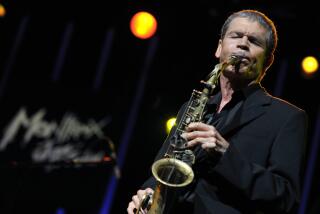It’s a Blast With the Brunson Brothers North Hollywood Trumpet Quartet Hustles to Catch On
It’s a night at the opera and, as the curtain calls conclude the performance inside, four brothers nervously wait on the plaza outside the Music Center downtown. They share the same boyish smile as the doors open to release a sea of tuxedos and glittery dresses. On cue, each brother raises a silver trumpet to his lips and begins blasting a whirring, hysterical “Flight of the Bumblebee.”
The curious crowd detours toward the wall of sound. Opera-goers stand transfixed as the players, known as the Brunson Brothers, pump out an electrifying “William Tell Overture” and a flourishing arrangement of “America” from “West Side Story.”
The screaming trumpets need no amplifiers. The audience lingers until the set is finished and their ears are ringing. Some declare the Brunsons the highlight of the evening and buy the brothers’ cassettes. Then one listener asks the jackpot question: “Why aren’t you guys playing inside?”
After more than 100 such nights, the Brunson Brothers have gone inside. In little more than a year, the four--Arlan, 31; Raland, 28; Deron, 27, and Gaynor, 25--have gone from playing for spare change on the streets of Los Angeles to “The Tonight Show” and “The Merv Griffin Show.” They played on NBC’s “Christmas in Washington” special before the Reagans and the Fox network’s “Christmas in Beverly Hills” with James Stewart.
An International Fanfare
Most recently, the brothers arranged and performed the Tournament of Roses Parade fanfare, a musical lead-in, for the international broadcast to 27 countries.
“We’re pretty good hustlers,” Raland Brunson, the group’s unofficial spokesman, said as he fiddled with a switch in their North Hollywood home studio. “When we first came down to Los Angeles (in January, 1985), we thought the best way to get exposure was to go to places where important people go to be entertained and, when they come outside, we’ll be all set up and we’ll blast away.”
The strategy worked: Their manager, Joseph Gunchef, first heard them outside the Variety Arts Center and agreed to represent them soon after. Johnny Carson booked them on the “Tonight Show” after they played for the audience waiting in the NBC studio parking lot in Burbank.
The brothers were born to strict Mormon parents in Provo, Utah. They developed an interest in music at an early age. While their peers were wearing out Beatles records, the Brunsons were bopping around the living room to the mariachi beat of Herb Alpert and the Tijuana Brass.
Their mother, Reba, tried unsuccessfully to interest them in the piano, but it was too tame. In 1971, Raland picked up a cornet and, within a few weeks, all four brothers were hooked. Reba bought them used cornets. Their father, Lynn, encouraged them, but worried about the expense of lessons.
“He wanted to wash it out of us, but we didn’t know that,” said Raland. “He told us, ‘We’re going to go 70 miles away to Brigham Young University and take lessons.’ We were excited because we didn’t realize that he was talking about six hours of lessons a day. He was going to drill us until we just wanted to quit. So we worked out six hours a day, and we were eating it up. Then, after two weeks, we learned a tune and our dad ran out of money.”
The plan had backfired--the brothers wanted to play more than ever. But, once the boys were back home, their father, concerned about money, decided to sell the cornets. However, the music store owner was convinced of the boys’ potential and presented Lynn with four shiny new silver Bach Stradivarius 43 lightweight trumpets. “Pay me when you can,” he said. “Your kids will be playing all up and down the state.”
They practiced individually every morning for an hour and together after school for at least two hours. Four-hour practice sessions dominated Saturdays. That discipline remains ingrained. Today, they practice at least four hours a day.
Power is the key to their sound. As a child listening to those Herb Alpert records, Raland was moved by their sense of power. “There is a lot of majesty in trumpets,” he said. “If you work with the trumpet right, there is a lot of substance in there to affect your feelings in a very strong way.”
Sometimes too strong. At a recent celebrity benefit for Big Sisters of Los Angeles, producer George Schlatter warned them: “I wouldn’t blow too hard because old people usually pay more to be in the front rows and you’re going to blow their lids off.”
The Brunson Brothers’ first album featured several of the gimmicky songs perfected in their street performances (which they rarely have time for anymore), but their second album will have some original material. One number, “Fleece Novae,” has a funky salsa flavor, and the brothers plan to arrange some “high-energy” danceable songs for the album in hopes of breaking the Top 40 barrier.
Pointing to the 12-track mixing console, synthesizers, drum machine, digital sequencer and other equipment that crowd their den, Arlan said: “This is where everything is happening. This is where our future is.”
‘Money Goes in Pot’
The Brunsons occasionally work with other musicians such as John Anderson of Yes, Carl Palmer and Keith Emerson. They recently produced a demonstration recording for a country and Western quartet called the Clinger Sisters.
When opportunities for session work at other studios crop up, the brothers send whoever has time to go. “The money we make goes in the pot,” Raland said. “We all have the same needs and desires. There’s a lot of trust within the group.”
When they started out, the brothers, who briefly called themselves the Brunson Burners, looked like clones with their deep-set blue eyes and close-cropped hair. But Raland and Gaynor have grown their curly blond hair to their shoulders and Arlan sports a beard. Still, they all could easily pass for 18.
“We believe the body is really important, so we do everything we can to keep it healthy--exercising, eating the right fresh foods,” said Arlan. None of them has tried drugs. The hardest drink to pass their lips has been Cherry Coke (which they dislike).
It has not occurred to the four brothers to get involved in the Hollywood fast lane, but that did not stop them from driving a secondhand limousine to their street performances. They bought the limo for practicality rather than pretense: It was a big car at the right price. Before the limo was stolen last fall, they delighted in soliciting donations after a performance and then hopping in the limo, much to the astonishment of their audience. (When asked about groupies, Raland said: “We are working on it, but we just can’t seem to get the girls to hang out with us.”)
Looking at the Brunson Brothers, it is hard not to think of another Mormon group of musical brothers from Utah--the Osmonds. But it’s a comparison the Brunsons downplay as often as they hear it. “We’ve met the Osmonds, and they seem like nice people,” Raland said and politely changed the subject. A few minutes later, when he explained that his group is striving for “the decent, good-guy image,” he is reminded of the Goody Two-Shoes image that Donny Osmond has never lived down. Laughing, he added: “Actually, the image we want to create is that we’re happening dudes.”
The Brunsons’ upbringing “was very sheltered compared to what happens to kids out here in California,” said Arlan. Leaving Utah was something of a culture shock.
Mormonism “plays a very big role” in their daily lives, said Arlan. It has provided much of the discipline they need to succeed. But, as with any other siblings, especially those who live together, there are conflicts.
Living together can be trying, Arlan said, and the brothers look forward to moving into separate residences within the next 18 months. “It is part of the sacrifice to make the future happen,” he said. “Right now, it’s financially convenient. We’re close and we’re working on some projects that we need to be on 24 hours a day. We’re always meeting and talking about what’s happening, so it’s very productive.”
“Actually, we fight about 15 or 16 times a day, but we work it out,” said Raland. Added Arlan: “We believe in what we’re doing, so we’ve had to get along with each other. We’ve been able to focus in on what is important and just keep going.”
Part of their drive is their competitiveness among themselves. “That is why we’re announced as lead trumpet players,” Raland said. Even on stage they will sometimes compete as they improvise the ending of a song. “That’s why we never end together,” Raland said. “That’s kind of turned into a gimmick, our stock in trade, where we don’t end together and we don’t bow together.”
Later this year, the brothers hope to take their bows on the same stage as Dizzy Gillespie and Al Hirt in a national college tour. “It’s not easy to sell four trumpet players,” said Raland. “When you hear four trumpet players, the first thing you think of is four music stands, four chairs and classical music. Or jazz. But no, man, we’re a hip bunch of guys. I think eventually we will not have to explain to people exactly what we do.”
More to Read
The biggest entertainment stories
Get our big stories about Hollywood, film, television, music, arts, culture and more right in your inbox as soon as they publish.
You may occasionally receive promotional content from the Los Angeles Times.










